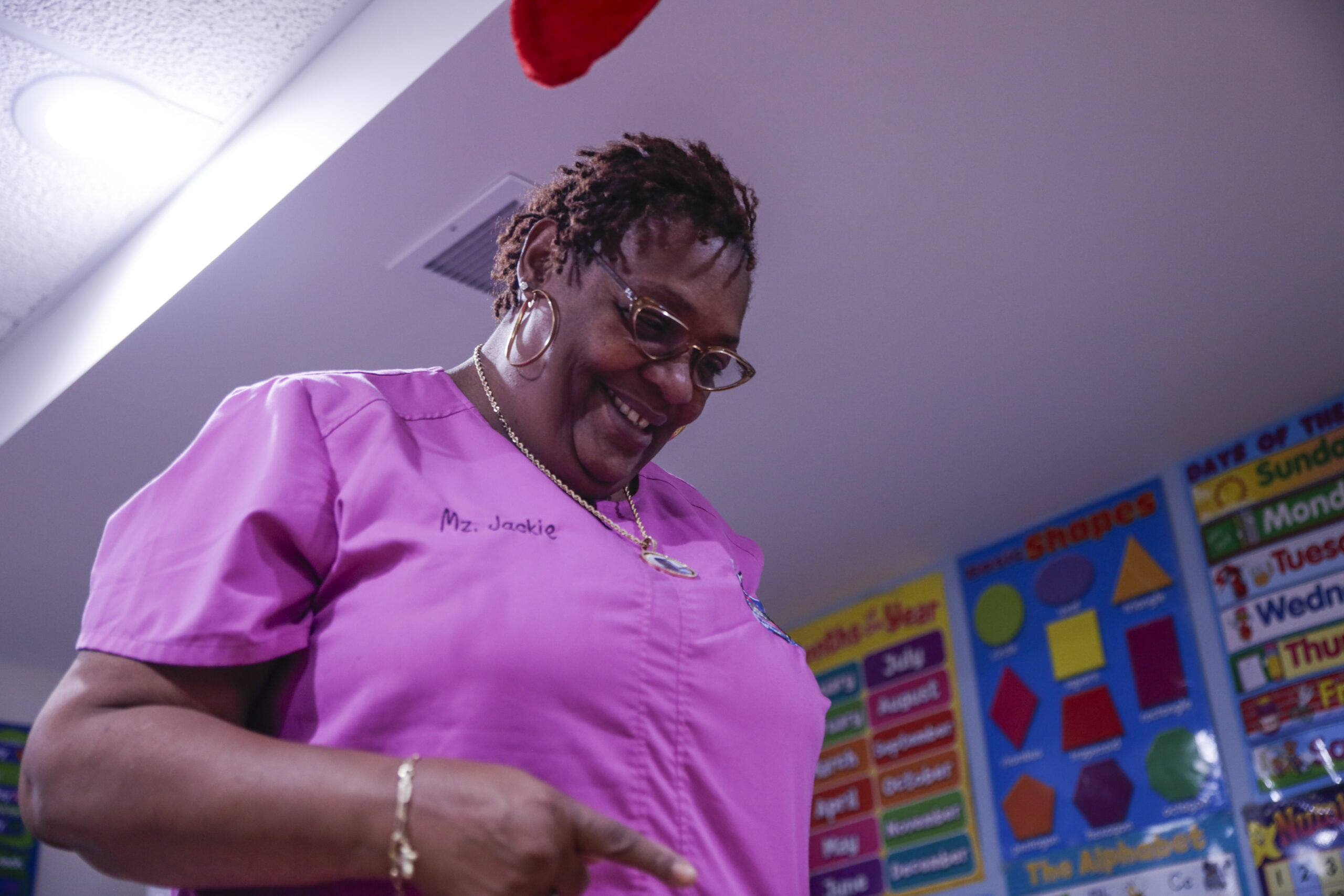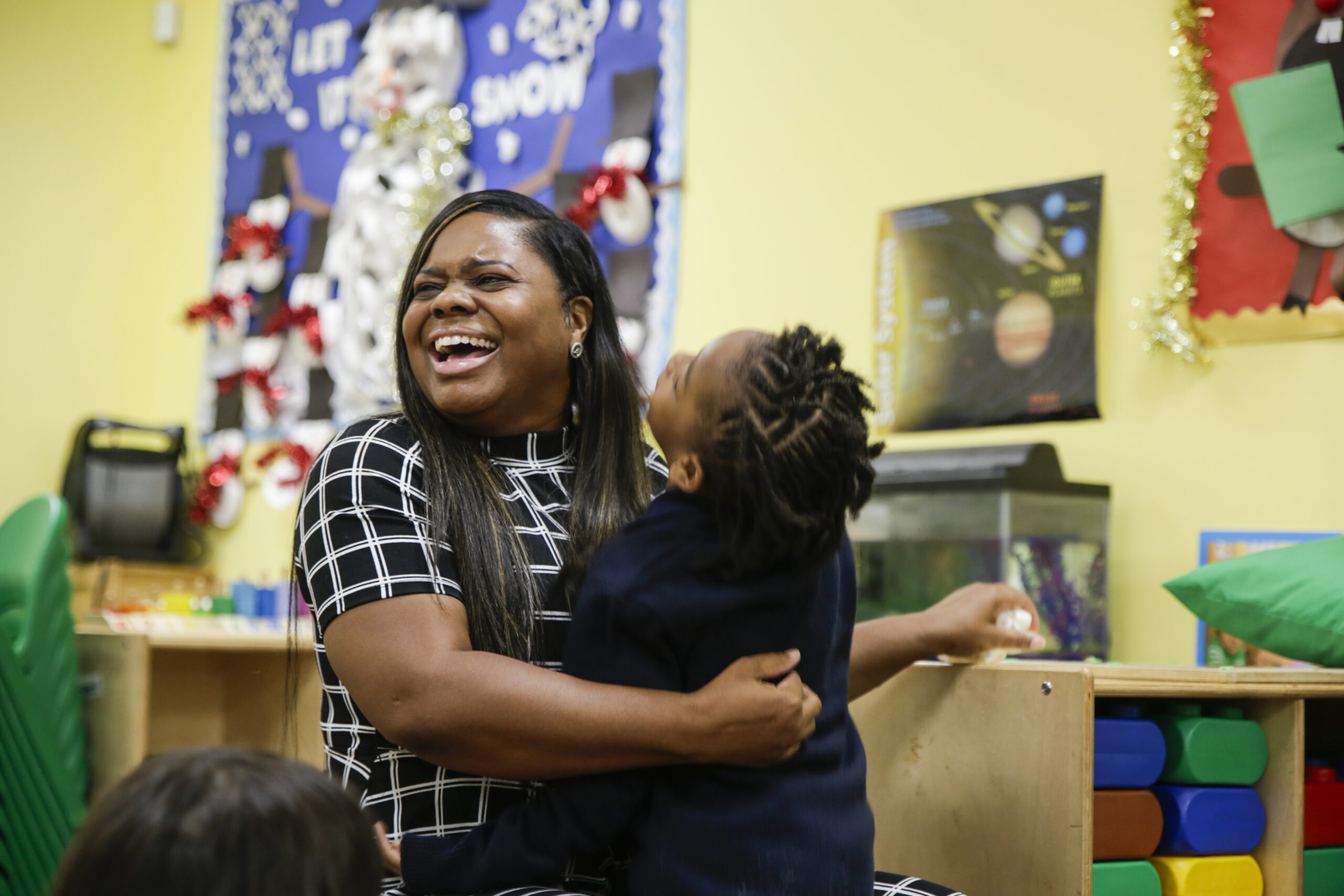In a Nutshell
What: The Quality Facilities for All Initiative (QFA) completed work for its Grant Program’s first cohort, renovating 14 early childhood education (ECE) facilities on Chicago’s South and West Sides.
Sector: Early Childhood Education
Location: Chicago, IL (South Lawndale, Englewood, and Roseland)
IFF Support: Approximately $50,000 for each of 14 grantees; six- to eight-week professional development course; oversight and management of renovation process, including conducting Facility Assessments, establishing scopes of work, guiding grantees through renovations, coordinating with contractors, helping directors prioritize their needs
IFF Staff Leads: Dana Garner, Programs and Initiatives Manager; Stephanie Love, Program Manager – Strategic Response; Kareem Cousar, Senior Owner’s Representative; Amanda Sigg, Senior Owner’s Representative; James Vinyard, Senior Owner’s Representative; Jessica Nepomiachi, Director of Special Projects; and Kate Ansorge, Managing Director of Real Estate Solutions – Chicago
Impact: As of November 2023, the program built one playground, expanded three classrooms serving 36 children, and enhanced 10 classrooms serving more than 100 children.
For Jacqueline Hopgood-German, director of The Babies Club early childhood education (ECE) center, everything is a teaching opportunity for her children.
Playtime cleanup isn’t a chore; it’s a fun opportunity to sort toys into the right box. “I make everything a life lesson learned: ‘This is how we’re gonna clean up our room,’” says Jacqueline, or Ms. Jackie as the kids call her. “I labeled the bins so they’ll know what goes where, and I sit right here and say, ‘Okay, put that back over there, and put this back over there.’ And they love it. They’re doing something constructive and they don’t even know it.”
For more than 22 years, Ms. Jackie has run The Babies Club out of her home basement in Chicago’s Roseland neighborhood on the South Side. Operating an ECE program out of a home comes with its own challenges. Some, like weekly shopping, can be solved with creative learning opportunities: “Come on y’all, we’re going to the store. Let’s learn about shopping.” Grocery runs become lessons about money, healthy foods, ‘stranger danger,’ and the digestive system.
Others are harder to deal with. “When my husband, Joe, passed away, I didn’t close,” Ms. Jackie says. “I needed to be around my kids. My kids kept me going. Joe loved those kids.” Joe’s first birthday after his passing became an opportunity for the kids to learn about death. Gathered in her back yard, they all released a balloon for him. “They’re helping me more than I’m helping them, and they don’t even know it.”
Still, some challenges need more than creative lesson building to solve. The bathroom was small and old; cracks periodically let in rainwater, damaging the ceiling and flooring; and there was insufficient storage to organize the supplies needed to run the daycare and maintain certifications.
These challenges led Ms. Jackie to IFF’s Quality Facilities for All Initiative.

Ms. Jackie has run The Babies Club out of her home in Roseland, on Chicago’s South Side, for more than 22 years.
Quality Facilities for All
The first few years of a child’s life are crucial for their cognitive, social, and physical development, and positive experiences at this early stage — including the physical space where they learn — will benefit a child throughout the rest of their life. Still, for many, high-quality early childhood programs remain inaccessible: A 2019 IFF report titled Access and Quality for Illinois Children found that fewer than half of Illinois children age 5 and under have access to an ECE provider close to home. As an element of broader racial and class disparities in the United States, this child care gap disproportionately impacts working class and Black communities, such as Roseland. And when structural barriers and racist policies such as redlining limit providers’ access to funding in these communities, many are forced to put crucial facility renovations on the back-burner.
IFF launched the Quality Facilities for All Initiative (QFA) in 2019 to support and fund high-quality infant and toddler care facilities in these Illinois communities with the greatest need. This mainly means creating facilities that are safe, dry, and warm by, for example, installing security shutters and two-way doors, fixing leaks at their source, and updating temperature control systems.
The initiative first launched as a Technical Assistance Program to assist Illinois ECE providers with limited capacity for grant writing as they applied for state funding for facility renovations. In 2020, when the COVID-19 pandemic paused state funding, IFF’s program team developed QFA’s Grant Program, directly funding renovations for infant and toddler programs in communities of color that have experienced long-term disinvestment.
In September 2021, 14 providers from Chicago’s South and West sides were selected to the Grant Program’s first cohort, each receiving approximately $50,000 for projects enhancing and/or expanding their facilities. The program also included professional development, providing grantees a six- to eight-week course covering topics such as facility quality and financial literacy. Members of IFF’s Real Estate Solutions team guided grantees through the renovation process. They conducted facility assessments; helped grantees prioritize their needs; established scopes of work; and coordinated with contractors. They also cultivated personal relationships with the grantees, getting to know them and, in the case of Ms. Jackie, attending funerals of loved ones.
With her grant, Ms. Jackie renovated her entire basement, installing new lighting, flooring, ceiling, and a fresh coat of paint. She also renovated her bathroom and kitchen and installed built-in shelving, giving her the organizational space that enabled her kids’ end of playtime pick-up, helping to keep the program organized and safe.
Building playful facilities

Tameki Warner operates Learn Together Grow Together II as one of four, soon to be five, ECE centers across Chicago’s South and Southwest Sides.
In addition to creating safe, warm, and dry environments, high-quality facilities should enable play. Tameki Warner, another QFA grantee, knows the importance of play.
Tameki is director of Learn Together Grow Together (LTGT), a set of four — soon to be five — ECE facilities across Chicago’s South and Southwest Sides. Her QFA grant was for LTGT II, based in West Englewood where she resides. Since acquiring the center in 2018, Tameki has made great efforts to connect with the community, building a relationship with the local alderman and setting up tables at the annual Englewood Music Festival held in September.
Connecting with her communities is tied directly to LTGT’s ECE work. Tameki tailors each center to the needs of its community and parents, whether that’s helping build resumes, find jobs, or getting bus cards. Child care, after all, is about families and entire communities. “We know if Mom is good, the child will be good. We don’t build friendships, we build relationships, because relationships last,” she explains. “Let’s get to know grandma, everybody that’s dropping off, because these people are a part of this child’s journey.”
Still, meeting all the children’s needs can be challenging. At LTGT II, one of Tameki’s biggest challenges was providing a safe play space. The center has a playground around the back side of the building, but the equipment was old, the ground was covered in rough wood chips, and the fence separating it from the street was low and rickety. “We would have kids getting hurt, scraped on the concrete out there,” she says. Every day, kids would come back from play time with scrapes and splinters. “We were like a nurse’s office.”
Nearby parks didn’t offer a better alternative. While Englewood devotes time and effort to bringing its neighbors together to build community, decades of disinvestment, economic exploitation, and racist redlining policies have led the neighborhood to struggle with the crime and violence that often follow from systemic exploitation. For Tameki, neighborhood parks are not always welcoming. She’s seen kids gathering in circles to talk about gunshots they’ve heard and teachers cutting playtime short after hearing gunshots.
For all these reasons, Tameki needed a new playground. QFA’s grant covered the otherwise prohibitive cost, allowing Tameki to build a new outdoor space in early 2022. “I love now that it’s a safe space, I love that it’s a quality space. That playground is a safe haven.” This outdoor space now contains completely new equipment, with separate play sections for infants, toddlers, and preschoolers. A tall vinyl panel fence replaced the rickety wooden one and soft turf replaced harsh woodchips. LTGT II no longer transforms into a nurse’s office every day after playtime.
The parents were excited too — Tameki hosted a family BBQ there this past summer — and the space gave the teachers peace of mind, but the best reaction was from the kids. All through construction, the kids asked for daily updates and pictures. When it was ready, Tameki held a ribbon cutting ceremony, with kids and parents present, and LTGT II’s backyard erupted with excited screams the moment she cut the ribbon.
View this post on Instagram
Learning opportunities
QFA’s Grant Program was designed to have a lasting, positive impact on its grantees, and the professional development course — a series of virtual trainings to discuss topics ranging from classroom design to branding — was critical to that.
“Initially I thought [QFA] was going to say, ‘Hey, you got the grant, here’s a check, go get what you need,’” says Tameki. “So, for QFA to make it a learning process, I thought that was really beneficial.” Following the courses, Tameki changed LTGT’s logo and marketing strategy.
Most impactfully, Tameki spent her time learning from other providers, seeing how they faced similar challenges and overcame them at their sites. “When I say learn together, grow together, that’s for everybody. That’s for the kids, the families, the staff.” For her, learning is ultimately about helping her families. “That’s what gives me satisfaction, to see that I’m helping families, I’m helping make a change,” she says. “I want us to be able to see that we got in that family, and we were able to set this child up for success.”
For Ms. Jackie, early childhood education is all about empowerment. “This is where you start a straight A student. I am glad to put that foundation in their life.” She wants to give them real life lessons that they can use going forward. “They know life is not fair, but I tell them there’s always another way to go around the obstacle and figure it out,” she says. “Look at the good side of it, no matter what it is. Look at the better side and you’ll be alright.”
Sometimes, that just means turning cleanup time into playtime.
Click here to read about additional child care facilities projects supported by IFF